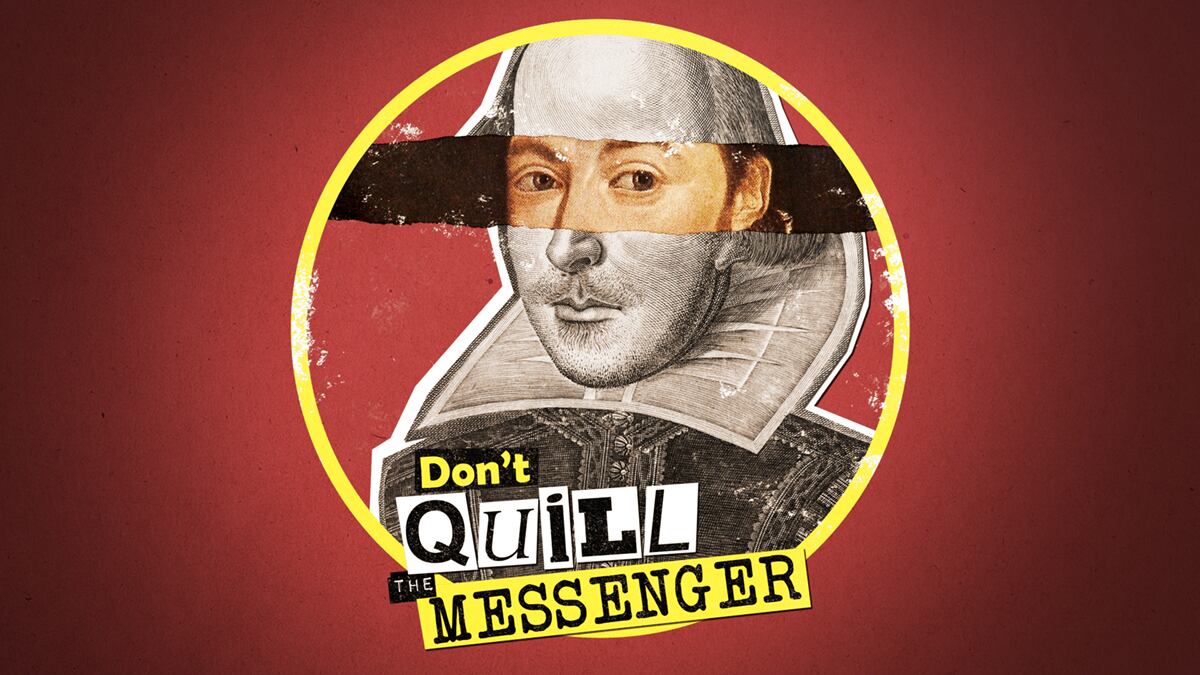Mention William Shakespeare in Southern Oregon and Ashland’s famous theater festival likely springs to mind before you reach “-speare.” But 40 miles northwest of the world-renowned Oregon Shakespeare Festival, a Grants Pass-based podcast is exploring a controversy that those who haven’t experienced King Lear or Romeo & Juliet since 11th grade English may not even know exists.
Don’t Quill the Messenger invites listeners down the rabbit hole of what host Steven Sabel politely calls “the Shakespeare authorship question,” which suggests William Shakespeare, the Bard of Stratford-upon-Avon, England (perpetually imagined as that mustachioed balding fella), did not pen the Western world’s most famous plays.
“Everyone should be fascinated by this topic,” says Sabel, a longtime theater actor, producer and director. “It’s the greatest literary mystery of all time.”
Sabel is a member of the Shakespeare Oxford Fellowship, an international organization that posits Edward de Vere, the 17th Earl of Oxford, was the true writer of the Shakespeare canon and rightful source of the pen name “William Shakespeare.” Such skeptics are known as “Oxfordians” and have historically included the likes of Sigmund Freud and Orson Welles. While it’s a belief dismissed and deemed either far-fetched or beside the point in most academic circles, Don’t Quill the Messenger makes its case by interrogating what it views as an undocumented and invented history of Stratford’s Shakespeare and plumbing the life of de Vere for textual connections.
“I understand why people are so attached to [the Stratford] myth,” says Sabel, highlighting its aspirational qualities. “It’s a very beautiful fairy tale, but it is not history and it’s not true. And there’s not a historian in the world that can say it is.”
Three years in, the podcast’s mystery crux helps endear Don’t Quill to its network, Los Angeles-based Dragon Wagon Radio, which just recorded its 3 millionth download. The show itself isn’t so much Oxfordian evangelism as amateur sleuthing, deep reading, and a genuine helping of Shakespeare appreciation. For his part, Sabel hosts with a welcoming, polished stage presence, conversing with guests like author Michael Blanding, former Washington Post journalist Robert Meyers, and many members of the Oxford Fellowship.
So what happens to someone once they believe Shakespeare wasn’t actually that Shakespeare? Well, if Sabel is any indication, they still adore the works. The Grants Pass podcaster helmed Southern California’s Redlands Shakespeare Festival for nine seasons and is staging A Midsummer Night’s Dream for the seventh time in his career in August—this time for his local Barnstormers Theatre. Even one of Shakespeare’s most accessible works is enlivened, Sabel says, when he tells performers how it functions as an allegory for the English court, reported from de Vere’s intimate perspective.
“The layers of political intrigue in that play come to light,” he says. “When the actors know that, they can play the humor that much better.”
Now, because it asserts, in part, that “the Stratford man” (as Oxfordians dub the broadly accepted Shakespeare) had neither the education nor the cultural vantage to pen plays with extensive knowledge of royalty, Italy and pursuits like falconry, the Oxfordian interpretation is sometimes derided as classist by its detractors. Sabel retorts that de Vere’s story reveals a “totalitarian” English monarchy hell-bent on silencing him; there’s little affection for aristocratic power here. And if the Oxfordian view could loosely be termed a conspiracy theory, Sabel assures it’s not a gateway to believing Michelangelo didn’t paint the Sistine Chapel.
“Historians are the unsung heroes who need to embrace this mystery and help us find the truth,” he explains. “Not literature majors, historians. They know how to follow a proper scientific question. They know how to conduct proper research.”
As for how Sabel and the Oxford Fellowship coexist with the Oregon Shakespeare Festival just down I-5, they’ve happily participated in OSF panels and forums. And while Oxfordians certainly seek the eventual validation of de Vere, Sabel touts the larger benefits of Ashland’s festival, or any other, engaging generally with the authorship query that sparked his podcast and inflects his entire artistic life.
“I believe every Shakespeare festival in the world that embraces the question—they don’t even have to take a position; let audiences decide for themselves—will watch those audiences come to those plays looking for clues,” he says. “That’s a great marketing hook.”
LISTEN: Don’t Quill the Messenger streams at dragonwagonradio.com/dontquillthemessenger.

